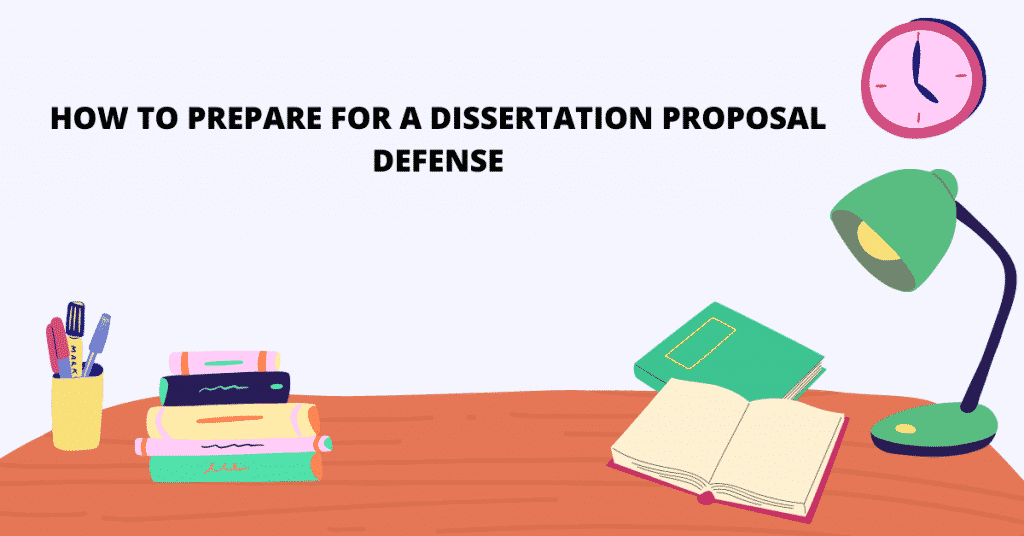Ph. D. and master’s degree students appear before a supervisory jury that examines their dissertation proposal. As a student, you need to defend your dissertation before the committee, thus the importance of preparing for the defense. You will agree with me that once you have written your dissertation proposal, a defense becomes imminent. Before submitting your final dissertation paper, you must avail your proposal. A jury panel demands your presence to answer some of the dissertation questions available.
The majority of Ph.D. students find dissertation proposal defense processes to be complicated. There is no need for alarm since we provide guidelines to help you prepare accordingly for the defense.

Dissertation Proposal and Defense Meeting Checklist
Things To Do Before The Dissertation Proposal Defense
Anticipate Questions
One of the first things to do is to anticipate questions. Try to find answers to the questions you are likely to be asked. You can ask those who had defended their proposal to tell you which kinds of questions they encountered. Determine your weak areas and work on them. If you identify some in your research or proposal, do not go ahead with your presentation before addressing them. Even if you can’t eliminate a particular weakness, try to handle it in a manner that will impress your committee and convince them you are aware of the proposal’s weaknesses.
Practice
The second step is to practice. The more you practice, the better your presentation will be. If you can find someone who has been a committee member to help you practice, the better your defense will be. The person can ask you questions, listen to how you respond, then advise you on how to polish up. You can also practice how to present your defense by ensuring your pronunciations are correct. If you are using PowerPoint slides for your dissertation proposal defense, make sure they aren’t wordy. Try to be clear and concise. This way, the committee members will have more time listening to you rather than reading the slides.
Also, make sure you familiarize yourself with the presentation room/hall and all the equipment you’ll use, including a laptop, projector, whiteboards, etc. It would also help to watch videos of other defenses to see how defenses are conducted and the questions asked.
Things To Do During The Dissertation Proposal Defense
Be Calm
During your presentation, you should try as much as possible to lower your anxiety level. You can do this by breathing deeply at least 3 to 4 times right before your presentation. As about present your defense, make sure you speak clearly, so your listeners can understand what you are saying – don’t rush. You can have a few moments of silence before you move to the next point.
To gain more confidence, remember the committee is there to help you pass and not to fail you. While they must maintain high academic standards, they will not in any way harass you but help you move forward in your academic journey.
Stick To The Point
When asked a question, concentrate on answering that one question. Don’t go beyond what you are asked. It would even be better to use ‘yes’ or ‘no’ if those will answer the question(s) adequately. If necessary, you can also create a dialogue with the committee. For example, it isn’t right to accept your mistake when a member disagrees with your point. Try and explain why you believe the point you stated is correct. The committee will be impressed by your willingness to dialogue and to think critically.
Keep Time
Another essential thing to remember is to keep time. If your presentation is supposed to take 30 minutes, do not go beyond this time. Or if you do, maybe take 5 more minutes. Again, rushing and taking a shorter time than recommended would mean you were anxious or ill-prepared. The committee will be left wondering why you never used your time well.
Things To Do After The Dissertation Proposal Defense
Submit Your Proposal To The Committee
After your dissertation proposal defense, you are required to submit your protocol and proposal to the institution’s review board. The board will go through these documents and suggest what you need to incorporate, depending on the gaps they discovered in your research and defense. Depending on how solid your research is, they’ll also give you permission to go ahead with data collection and analysis, so you can proceed with the next chapters of your dissertation.
Remember that it’s not easy to fail in a dissertation proposal defense because there are many things you have to do before the actual defense. All these things get approved before you move to the next step. Once you’ve done all the work and all the steps get the committee approval, the defense will be more like a formality, and it will be fun.
Tips To Help You Prepare A Dissertation Proposal Defense
Understand The Dissertation Defense Jury Expectations
The jury has expectations from the defense. Therefore, you can only prepare well when you understand the expectations. By examining the dissertation jury committee’s expectations, you know what to present and thus craft a remarkable presentation. Your dissertation supervisor or advisor should help you understand the expectations of the defense panel. Consequently, you will garner skills and information fundamental to addressing the particular expectations with clarity and confidence.
Get Ready To Answer Questions
From the moment you appear before the dissertation committee, you should expect questions. Preparing how to answer dissertation proposal defense questions will help you give a remarkable presentation. The defense process comprises multiple sections, and one is designated to questions and answers. Therefore, preparing in advance will help you formulate useful answers. Remember, some of the jury members will ask questions eyeing the holes and gaps in your proposal.
However, other committee members will ask questions to receive clarification on your presentation. You must, therefore, anticipate questions patiently and compose remarkable answers for the questions.
Acknowledge And Study Significant Literature
Your dissertation proposal defense must showcase relevant literature to your study. Therefore, ensure you understand other studies that relate to your investigation or dissertation. How do previously conducted studies affect your dissertation and findings? You need to understand available scholarship studies relating to your research that has been done in the past and acknowledge how it influences your research.
Understand Your Defense Audience
Understanding your defense audience helps you prepare. Every committee member has their standpoint, opinion, and motivation. You need to, therefore, acknowledge the motivations and standpoints of each jury member. To prepare successfully, consider looking for a dissertation candidate who did appear before the same panel. Understanding the audience helps you know the best way to present your proposal to meet all committee members’ needs.
Understand The Defense Focuses On The Intent Statement
You need to avoid presenting your dissertation’s result in the proposal defense. Instead, the defense is all about presenting a statement of your investigation. Therefore, the committee needs to understand what you will be investigating, what you will achieve from the study, how you will do the research and your time. It will then review your dissertation objectives and most probably add or remove some.
Things You Need To Avoid In A Dissertation Proposal Defense
Hastiness In Preparing Your presentation
The presentation you make in front of the dissertation defense panel determines the future of your Ph.D. candidacy. The majority of the students are always nervous. Thus, they tend to waste a lot of time worrying about the presentation instead of preparing. This leads to shoddy preparation that can make you score a lower grade. So, you need to take your time and learn your dissertation proposal in-depth. The result will be a crisp, clear, and propelling presentation.
Untimed Presentations
There is no doubt that you need to maintain a perfect impression in your presentation. However, time is a factor you need to encompass. You do not have the whole day for your defense. Therefore, ensure to understand your main points and area of concentration. Also, don’t have a boring presentation. Make it interesting and memorable but still informative.
Appearing Before The Comittee Unprepared
There are Ph.D. candidates who appear before the dissertation proposal defense panel without preparing at all. It would help if you got ready for the committee by preparing your defense. Take your time and go through other dissertation defense proceedings and understand the question angles that audiences pose. Learn from other candidates’ experiences before appearing before the panel.
Vague Answers
Committee members can be cunning, and you need to tread softly. Therefore, avoid answering questions that you don’t have answers for. In most cases, some committee members will ask questions to challenge your ability to facilitate the study. Presenting vague answers shows how ill-prepared you are. It would be best if you put aside any unstructured talk that doesn’t support your project. The information you present should be informative and logical from all angles. Informal discussions might ruin the entire presentation.
Stressful Situations
Nervousness before the defense date is possible. Nonetheless, you need to maintain a sober mind to ace the presentation. During the defense, you must showcase your confidence in the proposal and avoid showcasing your stress or nervousness—the defense eyes on testing your skills and knowledge as a Ph.D. student. How well you prepare for the dissertation defense determines how much you intrigue your audience. Therefore, understand the dos and don’ts before appearing in front of the panel.

Tips on How to Defend Your Dissertation Proposal Virtually
When you have to defend your dissertation proposal virtually, observe the following:
Online Meeting Setup and Structure (Time, Platform)
Find time to talk to your committee chair some days before the day of your dissertation proposal defense. Discuss how you will structure your presentation as well as the conferencing platform. You can also discuss the time of the presentation. For example, if you choose zoom, let all the committee members know early enough that the presentation will be conducted through zoom.
Strong Internet Connection
The internet supports virtual presentation. Test your internet connectivity hours before your presentation. If your home internet isn’t strong enough to support video calls, find an alternative location with a strong internet connection.
Test Screen Sharing Options
Virtual presentation platforms like zoom have many options when it comes to screen sharing. Things can get more confusing when using PowerPoint in its automatic presentation mode. You should use only the primary screen and practice very well.
Record Yourself
Record yourself presenting, then replay the videos to critique yourself. By seeing yourself presenting, you can easily see the mistakes you are making and polish them up. You can also record your final defense in case your presentation equipment encounters technical problems on your presentation day. That’s why you need some backup. Having all PowerPoint slides in only on one laptop is risky because the laptop may malfunction on your presentation day. Make sure your critical equipment and files have backups.
Professionalism Matters
The fact that you are defending your thesis virtually doesn’t mean you can do things unprofessionally. You have to dress formally and use a powerful webcam. Centre the webcam on your face and make sure you have proper lighting.
Questions To Expect During a Dissertation Proposal Defense
Research Questions
What is your study about, and why did you choose to research this in particular?
This question touches on the title of your dissertation. Explain what it’s all about and give a reason why you chose it. One reason could be that you discovered there’s a knowledge gap in your research area. Also, explain how your research will help society.
How did your research questions evolve during the research process?
As you research your dissertation topic, you’ll discover lots of information from those who have worked in the same field. The information you get will form the basis of your research questions. And the questions will evolve as you unearth more information.
How did you decide on which sources to include in your literature review?
Here, you are required to explain how you picked the sources you included in your literature review. Of course, you must convince the panel that you picked credible sources, including conference papers, dissertations, books, and peer-reviewed articles.
How did you design your study, and why did you take this approach?
Your study design is simply the steps you’ll take from the beginning to the end of your study. Explain your data collection and analysis procedure and how this procedure is relevant to your research purpose.
How generalizable and valid are the findings?
This question aims at testing your understanding of your sample and its relationship with the population. It also tries to establish the validity of your methodology. To respond to this question, you must assess your findings and sample and connect these with the population. Make sure you understand the concepts such as reliability, validity, and generalisability.
What were the main shortcomings and limitations created by your research design?
No research is perfect. So don’t struggle to portray your research as being flawless. Be bold enough to talk about the weakness of your research design, not forgetting to mention its strengths to counter the weaknesses.
Questions On Findings
How did your findings relate to the existing literature?
This question touches on your discussion chapter. It assesses whether you can compare your findings with what other researchers have found. If any of your findings differ from already published research, you should be able to explain why.
What were your key findings concerning the research questions?
This question wants you to link your research questions to your research findings. Do your research findings answer your research questions? If not, you have to explain what’s lacking and plan to address this.
Were there any findings that surprised you?
Here you are supposed to discuss findings that contradicted your expectations. It would help if you also tried to give reasons for the contrasts. Also, discuss findings not related to your research topic but are of interest.
Questions on Your Opinion
What biases may exist in your research?
Biases arise from the research itself, data collection, analysis, and interpretation. So you have to think critically about research biases and explain how they may exist in your research. Also, discuss how to mitigate these biases.
How can your findings be put into practice?
This question tries to determine whether your research has any value to society, more so how the new knowledge you’ve created applies to the real world. In this case, you’ll have to explain the problem your research is trying to solve.
How has your research contributed to current thinking in the field?
This question requires you to explain the theoretical rather than practical contribution of your research. When answering this question, try to explain how your research is essential and how it fits into the existing body of knowledge. It is important to remember that you’ll not be working in a vacuum but building upon what other researchers have done.
If you could redo your research, how would you alter your approach?
This question is a little tricky because it might make you think your research has no value, and you need to re-do it, far from it. In this question, the committee is trying to find out how to deal with your shortcomings and limitations. They are trying to find out whether you’d prefer using a different data set or employing a different method of data analysis.
Conclusion
After going through the above tips, you should prepare well for your dissertation proposal defense. The most important things to remember include practice and equipment/data backup. Also, remember that you don’t need to be anxious. If anything, the committee is there to help you pass and move to the next phase of your studies. Make sure you test any equipment/device you intend to use before the actual presentation day. You can also think of having a power backup just in case the electricity goes off in the middle of your presentation.
How long does a dissertation proposal defense last?
There’s no fixed amount of time for dissertation proposal defense. The time taken depends on the institution and the nature of the thesis. On average, most defenses take about two hours. The best thing to do is to consult your institution or department on this issue.
What does it mean to defend your dissertation proposal?
The purpose of defending a proposal is to assure the committee that your topic and research process holds academic merit and is complete. It would help if you work hand-in-hand with your supervisory committee throughout your research and defense.
How do you defend a proposal?
To defend your proposal, you must appear before a committee and present to them what your research is also about. In the process, they will ask you questions that you should be able to answer adequately.
What happens after your proposal dissertation defense?
After your defense, expect your committee plus the internal and external supervisors to suggest some revisions you need to incorporate in your dissertation. After incorporating these revisions, you may be required to go for a second presentation or your supervisor may decide to just sign it off.
How do you successfully defend a dissertation?
1. Never underestimate the time you take to get ready. for the presentation and ensure you make use of multiple practice talks.
2. Pay attention to other thesis defense talks.
3. Ask your friends to help you prepare for the defense by asking you questions.
4. Go through the entire thesis and come up with your own set of questions.
5. Avoid distraction and prioritize focusing on your defense talk.
6. Ensure you have a good structure.
7. Practice every day to build your self-confidence.



